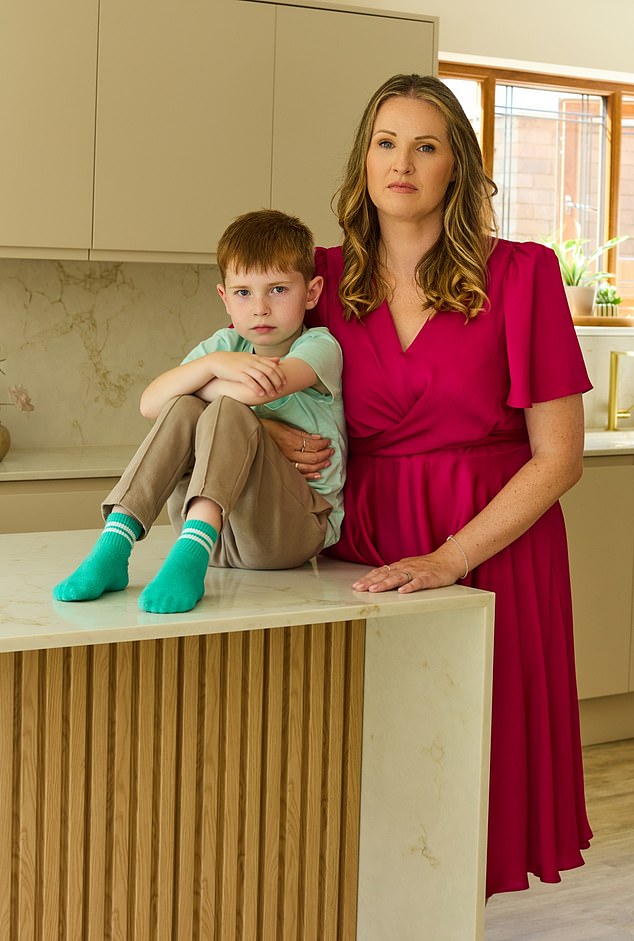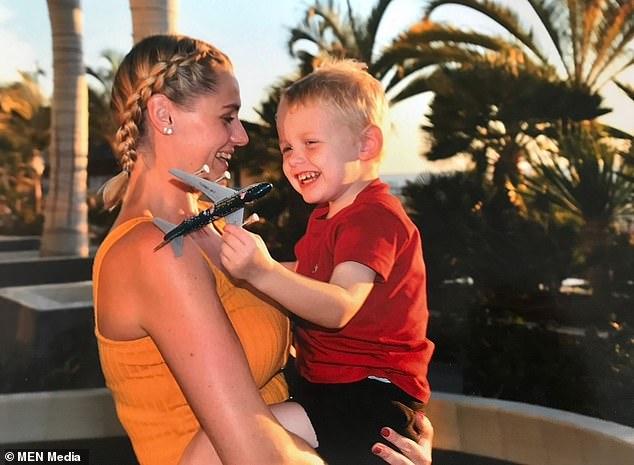It’s something that will be familiar to most parents: that annoying phase when your infant can’t seem to pick up a toy without putting it in their mouth. But that was never the case for Michelle Jacques’s son, Arlo, now six.
‘He wouldn’t put anything near his mouth – toys or food,’ says the 38-year-old stay-at-home mother from Essex. ‘He immediately had a look of disgust on his face. He had this fear of it.’
Everything had been going well with weaning Arlo, until his parents, Michelle and Andy, also 38 and a wedding DJ, introduced texture. They tried everything, from home-cooked meals to jars of baby food and snacks, but Arlo wouldn’t chew or swallow any of it. ‘We thought, “is he just being fussy? Have we not tried hard enough?”’ says Michelle.
Of course, many toddlers go through a ‘picky’ phase – but what happens when their refusal to eat what you’ve put in front of them is a sign of something more serious?
Having only been recognised as an official diagnosis by the NHS in 2013, you could be forgiven for not having heard of Arfid (avoidant/restrictive food intake disorder), in which sufferers restrict or avoid certain foods or food groups entirely. It can start at any age – even in adults with no previous history of disordered eating – but is startlingly common in infancy and pre-teens.
Discussion of Arfid is ablaze on social media; one recent post on TikTok received more than 20million views, and videos posted by young adults discussing their struggles with Arfid regularly attract thousands of likes.
It’s not known how many cases there are in the UK, but eating disorder charity Beat reports that calls to its helplines about Arfid have increased sevenfold since 2018, possibly thanks to slowly increasing awareness and a generation of parents who are more alert to anxiety in their children. It is, says head of safeguarding Kerri Fleming: ‘A very complicated illness with devastating effects on people’s day-to-day lives. But because it’s seen as picky eating or a choice by some people, it’s not taken as seriously as it should be.’
What sets Arfid apart is a lack of focus on body image.

Michelle Jacques says her son, Arlo, wouldn’t chew or swallow any food when he was going through the weaning phase

Beat head of safeguarding Kerri Fleming says Arfid is a ‘very complicated illness with devastating effects on people’s day-to-day lives’
‘People hear “eating disorder” and jump to the stereotype of an underweight teenage girl,’ says Ms Fleming. ‘But there is no way to tell by looking at someone if they have Arfid or not. Their weight is irrelevant.’
Some sufferers will only eat beige carbohydrates, such as plain pasta and toast, which are bland and more uniform than fruit and vegetables. Many are hypersensitive to smell and texture, or simply don’t experience hunger cues, while others develop a fear of eating following a traumatic incident, such as choking or vomiting.
Child psychologist and Arfid specialist Mona Hansen, tells me about a nine-year-old girl who developed the condition after a family member forced her to eat spaghetti, causing her to throw up in front of people.
‘She had problems with textures, any food with lumps or an uneven quality,’ says Ms Hansen, ‘and a fear of gagging ever since.’
Ms Hansen has also seen a rise in patients walking through her door. From children as young as two-and-a-half years old – a boy living on toast, chicken nuggets and margherita pizza and whose desperate family can’t find a nursery that will accommodate his restrictive diet – to a woman in her 70s, who had been criticised for being a ‘picky eater’ her entire life.
Nurseries and schools often struggle to understand and Ms Hansen regularly hears about children being refused their ‘safe foods’ and humiliated in front of their peers.
Meanwhile, NHS support is a postcode lottery – some trusts have funding for diagnostic services but not treatment plans, others don’t tackle Arfid at all. The majority of eating disorder services explicitly don’t offer specialist help for it either. It means we’re lacking training, accurate knowledge and awareness around a condition where quick intervention is said to be key.
One major stumbling block is the lack of NICE (National Institute for Health and Care Excellence) guidelines about Arfid, leaving medical professionals feeling ill-equipped to recognise or support it.
It was very much “here’s this leaflet, scan this QR code, go on the NHS website”. It felt very dismissive
‘Avoidant/restrictive food intake disorder is a known condition, but was not included in our guidelines on the recognition and treatment of eating disorders because there is little available evidence on which to make recommendations,’ a NICE spokesman told me.
What most people don’t understand about Arfid in children, say the families I speak to, is that nothing can make their child eat something they don’t want to.
By the time of his two-year check, Arlo was only drinking milk and sucking on crisps, biscuits and breakfast bars. His iron levels were unusually low, but their GP downplayed any concerns over his nutrition.
‘We were told that he was just a fussy eater and would grow out of it, there’s nothing wrong,’ says Michelle. ‘It was very much “here’s this leaflet, scan this QR code, go on the NHS website”. It felt very dismissive.’
‘I read all the fussy eating guidance of how a child should sit up at the table at a specific angle, not to be on a tablet or watching your phone, and without any distractions. We tried absolutely everything, including trying to force him to eat. It felt like they were blaming us.’
But, having successfully weaned her daughter, who’s three years older, Michelle knew there was a problem.
‘Millie is a fussy eater but she’ll always accept an alternative. Kids do go through that phase, but then they come out of it and everything is fine. With Arlo, it was like we went into that stage and never came out,’ she says.
Michelle made a point of going back to the GP around once a month. ‘I wanted it on record that he still wasn’t eating. I had to become that annoying parent,’ she says. Her constant chasing and refusal to back down worked, and Arlo was eventually seen by a paediatrician and a dietician. But when the family moved house they found that, despite their new home being just four miles away, they were discharged and told they’d need to be referred again for care in their new neighbourhood.
It was in that very last appointment that Arlo’s paediatrician dropped a bombshell.
‘He said: “You know, I wouldn’t be surprised if I was to ever meet you in the future that your son would have Arfid”,’ recalls Michelle. ‘And I was like, “what’s Arfid?” He just said, “Look into it.” No one had ever mentioned it before.’
Back home, his parents googled the condition and found that Arlo, who was only eating milk and yoghurt by that point, ticked practically every box. But when they asked their GP about it, they were again fobbed off – as the doctor had never heard of it.
Worse, there was no sign that Arlo’s care had been transferred. ‘How can you just dump a three-year-old?’ asks Michelle. ‘Eventually, the GP turned around and said, “Oh, just get on with it.” That lit a fire in me. No, I’m not just going to get on with it. This is not OK.’
Indeed, the health risks associated with Arfid are serious.
In 2021, seven-year-old Alfie Nicholls, from Stockport, suffered a fatal cardiac arrest at home as a result of undiagnosed Arfid. Malnutrition can lead to blindness, deafness, osteoporosis and cardiovascular problems.

Aflie Nicholls, pictured with his mum Lucy Morrison, died in 2021 at just seven years old

Child psychologist and Arfid specialist Mona Hansen regularly hears about children being refused their ‘safe foods’ and humiliated in front of their peers
There’s also the emotional toll. Children regularly become distressed when faced with the pressure to eat and parents feel as though they’re walking on eggshells. Siblings are sidelined. Family and friends can appear judgemental, mistaking the problem for a lack of parental discipline.
Meals out are almost impossible, with waiting staff and fellow diners openly questioning why a child isn’t eating. Going abroad, where specific safe foods aren’t available, isn’t feasible. ‘Even on holidays in the UK I’m googling where the hospitals are,’ says Michelle, her voice momentarily cracking. ‘Sometimes my husband gets home and I’ll just burst into tears because it will all feel so overwhelming.’
That sounds familiar to Joanne Read, 39, an early years educator from Winchester.
‘It has a huge impact on your mental health – the judgement, the embarrassment, the shame. Is it something that we did? Did we feed her something that was too hot? Did she choke without us realising? Could we have prevented this?’ she says.
Her daughter Ethel, five, first showed signs of Arfid at around a year old, refusing anything too sloppy, gagging on hot food, such as meat, and only eating crunchy snacks.
Joanne and her husband, Mark, 43, a sales director, tried everything they could think of: withholding food, bribery, being nice, getting cross. ‘Nothing worked. The interest just was not there,’ says Joanne. ‘She would push it away. She would just not eat or throw it on the floor.’
Their interactions with the health service share many similarities with Michelle’s, including endless GP visits during which they were brushed off. ‘They would say “it’s a stage, it’s because she started nursery” – there was always an excuse,’ she says. Hard-won paediatrician and dietician appointments came to nothing because they insisted that, because Ethel was considered to be a ‘normal’ weight, she was well.
‘But I knew she was only getting by because her food was calorific,’ says Joanne, who had found Arfid online and suspected that Ethel might have the disorder. ‘They just kept saying “let’s see if she grows out of this phase”,’ says Joanne. ‘Well, it’s a phase that has gone on from 18 months until now at five.’
Eventually, the paediatrician suggested a five-day observational stay in a local hospital, which Joanne describes as ‘the worst week of my life’. Her daughter, she says, was screaming as nurses brought her soggy food she was petrified to eat and put new foods on the same plate as Ethel’s safe foods – a no-no, as it can put a child off from eating something they currently accept.
The paediatrician, she says, only visited once for ten minutes and remained adamant Ethel didn’t have Arfid – but did mention, almost in passing, that there was an Arfid specialist in the building.
‘I was like, “are you joking?”’ Joanne recalls. ‘There was an expert here all along?’ He diagnosed Ethel as having Arfid after her first appointment and suggested she might also have ASD (autism spectrum disorder), which a 2023 Harvard study found could be present in more than half of Arfid sufferers – Arlo included.
Given the lack of research into the condition, treatment options are limited. Older children can respond well to CBT (cognitive behavioural therapy), while younger ones may benefit from play therapy and gentle food exposure. Some take anxiety medication.
Arlo was finally diagnosed in May 2023, after his parents decided to pay for a private specialist at the Birmingham Food Refusal Service. It was the validation they’d been waiting for, Michelle says, but it also ‘backfired’ because their local health trust didn’t treat Arfid so would no longer support him, and he was considered too young to be helped by CAMHS (Child and Adolescent Mental Health Services).
After having appendicitis last summer, Arlo started to refuse solids completely, now eating only milk and supplement shakes. Michelle fought to get him under the care of the complex feeding team at the Evelina London Children’s Hospital – who she calls ‘brilliant’ – where Arlo had his first appointment in April this year, after 11 months on the waiting list.
Michelle tells me she knew what was coming: her son’s Arfid had become so severe that doctors recommended that he have a feeding tube fitted in order to give him the calories and nutrients he needs.
‘My worry is that once we go there, is that it? Is it going to come back out?’ she says. ‘If it happens it will be overwhelming and awful.’
Indeed, on hearing that he would need a tube, a frightened Arlo turned around to his parents and told them: ‘I’ll try to eat.’
So far, he has – snacking on Skips and Pom Bear crisps, enough that the hospital has delayed fitting a tube by six months.
‘I do think if his Arfid had been picked up sooner, we may not be on the way to a feeding tube,’ says Michelle. ‘I’m just hoping there’s a miracle and he can eat enough to potentially not have one.’
For more information and support, visit beateatingdisorders.org.uk.
Michelle Jacques and Joanne Read co-host the podcast 3 Mums, 1 Mission, available on Spotify.
